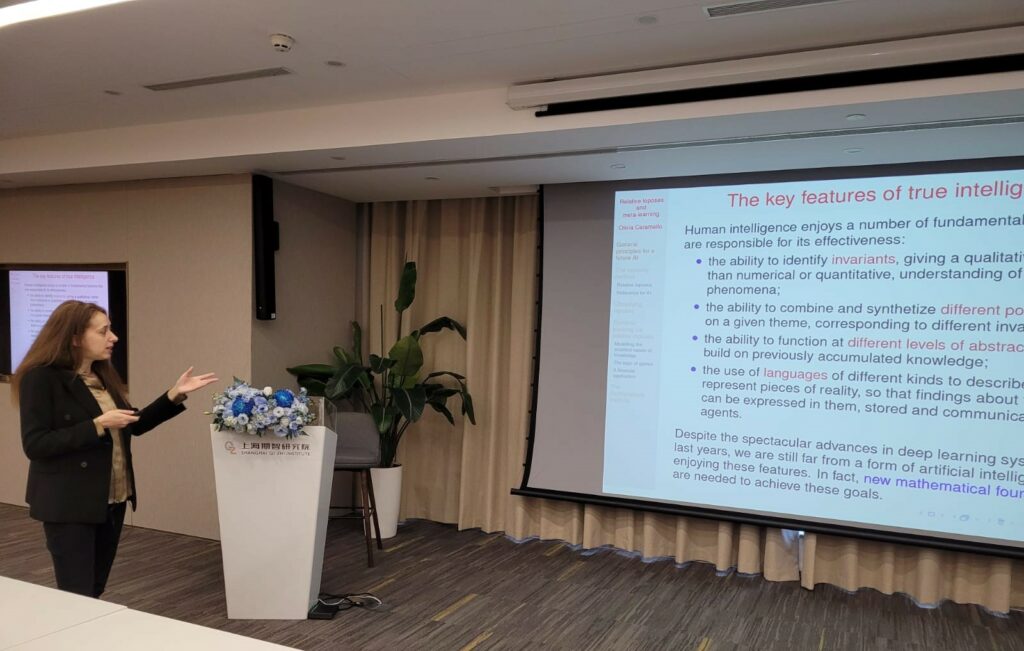

Prof. Olivia Caramello, Coordinator of the Centre for Topos Theory and its Applications (CTTA), gave an invited lecture at the recent International Workshop on Structural AI (Shanghai, 13-16 June 2025) organized by Prof. Andrew Yao, winner of the Turing Award and founder of the Qi Zhi Institute (which hosted the event) and his colleague Yang Yuan from Tsinghua University.
The conference explored the crucial role of structural approaches in the development of future artificial intelligence, bringing together experts from different fields – from mathematics to software engineering and from biology to robotics.
The conference focused on the strategic role of structured models in improving fundamental aspects of AI, such as transparency, verifiability and security.
In his presentation, Caramello provided a conceptual introduction to the theory of relative toposes, currently developed by CTTA, illustrating its relevance for designing new forms of artificial learning capable of operating on multiple layers of abstraction and integrating different levels of representation and analysis.
| Cookie | Duration | Description |
|---|---|---|
| __stripe_mid | 1 year | Stripe sets this cookie to process payments. |
| __stripe_sid | 30 minutes | Stripe sets this cookie to process payments. |
| _GRECAPTCHA | 5 months 27 days | This cookie is set by the Google recaptcha service to identify bots to protect the website against malicious spam attacks. |
| cookielawinfo-checkbox-analytics | 1 year | Set by the GDPR Cookie Consent plugin, this cookie is used to record the user consent for the cookies in the "Analytics" category . |
| cookielawinfo-checkbox-necessary | 1 year | Set by the GDPR Cookie Consent plugin, this cookie is used to record the user consent for the cookies in the "Necessary" category . |
| CookieLawInfoConsent | 1 year | Records the default button state of the corresponding category & the status of CCPA. It works only in coordination with the primary cookie. |
| elementor | never | This cookie is used by the website's WordPress theme. It allows the website owner to implement or change the website's content in real-time. |
| viewed_cookie_policy | 1 year | Set by GDPR cookie plugin: this cookie records the user consent for the usage of the cookies upon accept and reject. |
| wp-wpml_current_language | session | No description available. |
| Cookie | Duration | Description |
|---|---|---|
| CONSENT | 2 years | YouTube sets this cookie via embedded youtube-videos and registers anonymous statistical data. |
| Google Maps | Google Maps is a map visualization service managed by Google Inc. and is used to integrate such contents within its pages. |
| Cookie | Duration | Description |
|---|---|---|
| m | 1 year 1 month 4 days | No description available. |
| Cookie | Duration | Description |
|---|---|---|
| VISITOR_INFO1_LIVE | 5 months 27 days | A cookie set by YouTube to measure bandwidth that determines whether the user gets the new or old player interface. This cookie is mandatory to show videos in the homepage. |
| YSC | session | YSC cookie is set by Youtube and is used to track the views of embedded videos on Youtube pages. This cookie is mandatory to show videos in the homepage. |
| yt-remote-connected-devices | never | YouTube sets this cookie to store the video preferences of the user using embedded YouTube video. |
| yt-remote-device-id | never | YouTube sets this cookie to store the video preferences of the user using embedded YouTube video. |
| yt.innertube::nextId | never | This cookie, set by YouTube, registers a unique ID to store data on what videos from YouTube the user has seen. |
| yt.innertube::requests | never | This cookie, set by YouTube, registers a unique ID to store data on what videos from YouTube the user has seen. |